There are a few synonyms for the word “nasal dilator”. You can, for instance, talk about nose vents or nose clips. But no matter what you call them, they are always used to gently widen the nostrils and keep them open. They are nasal snoring solutions because they keep the nasal airways clear, which allows you to breathe deeply and helps control snoring.
Difficulties Breathing Through the Nose
Normally, people breathe through the nose. You certainly know from your last cold how annoying it can be if you cannot do that. However, there are many people with impaired nasal breathing but who not not have a cold. You can find out if you are one of them by doing a nasal snoring test.
Our nasal dilator overview is a good place to start for models, sizes and shapes.
As far as nasal snoring solutions go, a nasal dilator is an excellent choice. It gently widens the nostrils and thus ensures that there is less airway resistance in the nose. In other words, breathing air can flow through the nose into the lungs more easily. Once the body notices that nasal respiration functions again, it will automatically switch to (the much healthier) nasal breathing.
Depending on the type of snoring, anti-snoring solutions for sleeping on your side, such as an anti-snoring pillow, may also be useful as an alternative or complementary measure.
Another method to solve the problem would be surgery of the nose. This is usually indicated when an anatomically significant problem exists, when nasal septum is deviated or nasal cavity is obstructed due to polyps or enlarged nasal concha.
If you don’t solve your nasal breathing problems, this can lead to snoring or intensify existing snoring. This happens when the breathing air which streams through the mouth forces the tissue of the soft palate to vibrate. Mouth breathing is far more unhealthy than nasal breathing.
Different Types of Nasal Dilators
Technically, there are two different approaches provided by a nasal dilator in order to open the nostrils. Either it will have take the form of a small tube (cylindrical form) or that of a wing shape. While both forms are effective, there are notable differences: A Wing-shaped nasal dilator tends to be more effective but somewhat less comfortable a while tube-shaped nasal dilator is more comfortable, but somewhat less effective. Whatever the form, a nasal dilator will ensure that the nasal wings do not collapse. Should the nasal wings collapse, it would make nasal breathing very difficult, particularly when one breathes in deeply through the nose.
A Nasal Dilator is Very Versatile
A nasal dilator helps, to control snoring. Nasal congestion or obstruction are major causes of snoring, and these devices provide effective nasal snoring solutions. Moreover, a nasal dilator can also used in sports and for other strenuous activities. You can find a selection of particularly effective snoring stoppers here.
- OSAS-patients:
A nasal dilator can help people who suffer from obstructive sleep apnea syndrome by reducing the severity of their breathing pauses through better nasal respiration. They are, however, only suited as a supplement to other therapies (CPAP-therapy or snoring mouthpieces, for instance).
- Habitual (e. g. „primary“) snoring without anatomical significances:
In the case of primary snoring, a nasal dilator may improve nasal breathing. They enhance nasal airflow and can prevent the airways from contricting. This would otherwise lead to air turbulence and vibrations in narrower areas.
- Persons with vestibular stenosis (nasal valve collapse):
A vestibular stenosis is triggered by unstable nasal wings which collapse (sag) during inhalation – narrowed nostrils make it difficult to breathe through the nose. A nasal dilator can help address this problem very well and greatly improves nasal respiration. Alternatively, nasal strips may also prevent snoring very effectively.
- Persons with rhinitis:
Patients that suffer from a chronic form of rhinitis (nasal congestion) or an allergic rhinitis (also known as hay fever) can help themselves by using a nasal dilator (or nasal strips). The inflammation causes the airways to narrow, which then leads to impaired airflow. A nasal dilator widens the constricted space. In these instances it may be beneficial to implement combined nasal snoring solutions. In addtion to the nasal dilator it may be helpful to also clean the nose with a nasal rinse / irrigation.
- Persons with allergies (pollen and dust allergy):
Persons, who have a pollen or dust allergy, find effective respiratory support in a nasal dilator with an integrated breathing air filter. These nose vents come with a filter that absorbs pollutant particles, such as pollen, dust and smoke and keeps them away from your airways.
- Endurance athletes:
It has been scientifically proven that improved nasal breathing enhances performance – by up to 30%. That’s why a nasal dilator is often used for endurance sports like jogging, cycling, hiking or climbing. Certain models are specifically designed for the needs of this target group.
Effective Nasal Snoring Solutions: The Nasal Dilator
On the question “How to stop nasal snoring”, a nasal dilator is one of the best nasal snoring solutions, but it is not always the right aid! A nasal dilator is the best way to prevent snoring caused by narrowed nasal airways, i. e. so-called nasal snoring. In the case of mouth-based snoring, a nasal dilator can be an excellent supporting device. Oral snoring can be fixed by using a snoring mouth guard (for mouth snoring). However, such a mouth guard can only be used if you can breathe freely through the nose – this can be ensured by using a nasal dilator. Combining a snoring mouth guard with a nasal dilator is almost a “classic” approach to control snoring.
Advantage: Nasal dilators come with very few side effects.
With cone-shaped nasal dilators, the side effects are limited to a slight mucous membrane irritations which should normally subside after a month at the latest. Those on a budget will find an inexpensive snoring aid to start with.
Nasal Dilator: Finding the Perfect Fit
If you are looking for a nasal dilator to control snoring that is also comfortable, you should choose the right size when buying it. One that is too big can quickly lead to an unpleasant feeling of pressure in the nose – patients then often stop using it. Conversely, it is too small, it won’t fit tightly enough and might, in many cases, fall out of the nose as you sleep at night. This can lead to huge frustrations (“It doesn’t work!”). But you do not need to experience these frustrations! It is a good idea to purchase a “starter-pack” of which includes different sizes, this way you are bound to find the nasal dilator that best fits you. Once you have found the size that best fits you, you can buy packages with the correct size for you, in future..
Last but not least: nasal dilators should be replaced every three months for hygienic reasons – even though the material is considerably more durable.
Mandibular advancement device (MAD) purchasing guide
Advises you what you should pay attention to when buying a mandibular advancement device (MAD). We present different models and technical approaches here.
Positional therapy purchasing guide
Helps you make an informed buying decision when buying a positional therapy device, such as an anti-snoring vest or anti-snoring backpack.
Mandibular advancement device comparison
All our mandibular advancement devices compared based on comfort, application, cleaning and much more.

Medical Doctor, Berlin
Jan Wrede works as a medical doctor in Berlin. He studied medicine at FAU University in Erlangen-Nuremberg and Semmelweis University in Budapest. He had already written numerous scientific articles during his studies, especially on the subject of snoring.


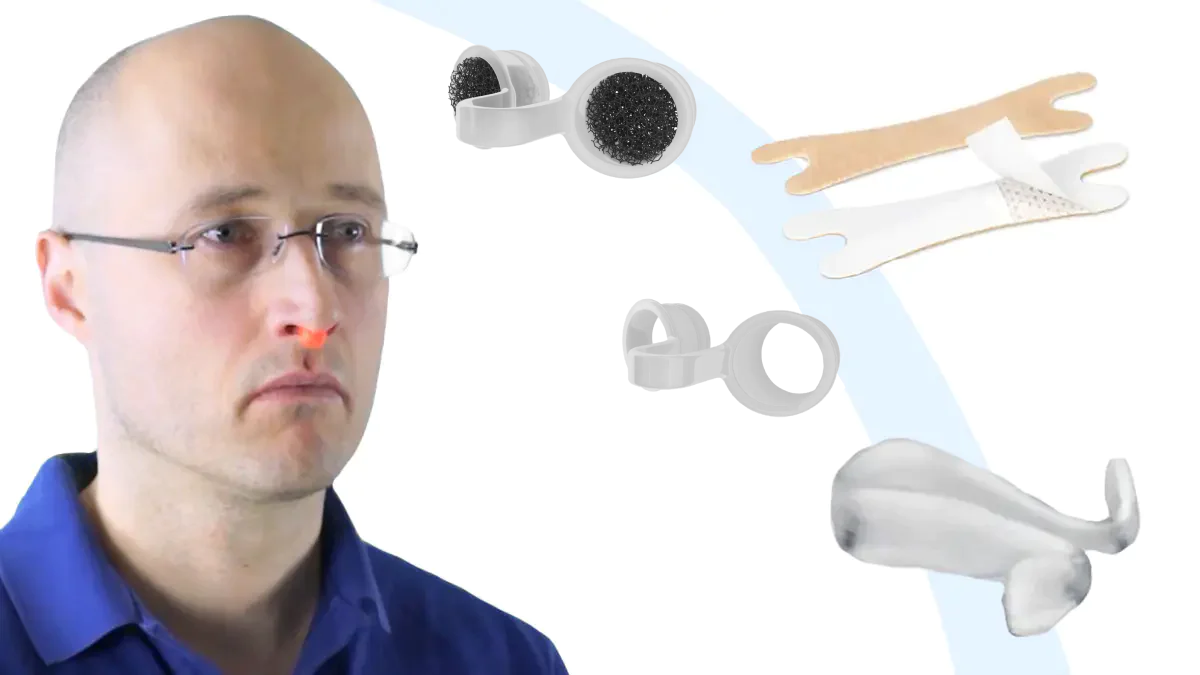
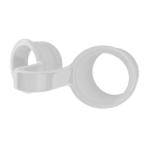
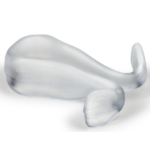
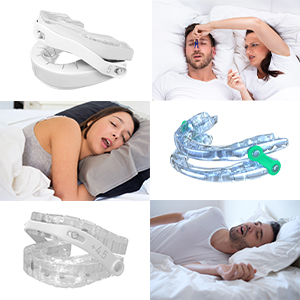
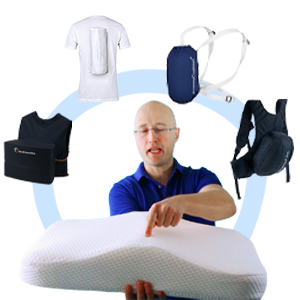
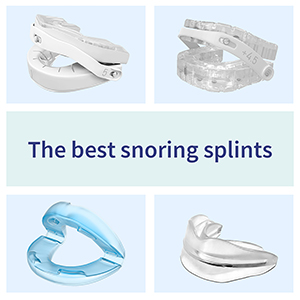

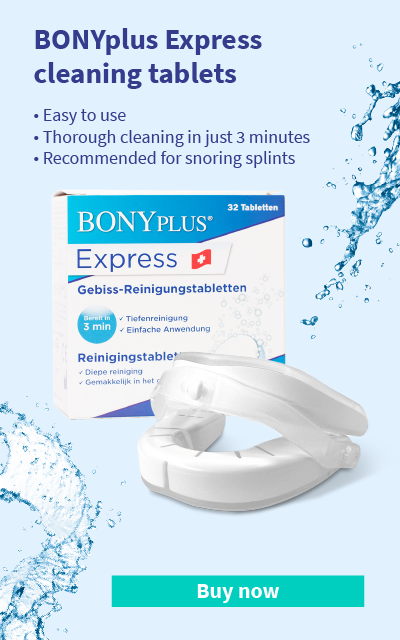
 Welcome to SomniShop
Welcome to SomniShop